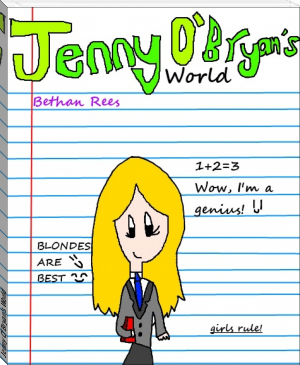The History and Records of the Elephant Club, Doesticks and Underhill [ereader with dictionary .TXT] 📗

- Author: Doesticks and Underhill
Book online «The History and Records of the Elephant Club, Doesticks and Underhill [ereader with dictionary .TXT] 📗». Author Doesticks and Underhill
E-text prepared by Bryan Ness, Graeme Mackreth,
and the Project Gutenberg Online Distributed Proofreading Team
(http://www.pgdp.net)
from scanned images of public domain material generously made available by
the Google Books Library Project
(http://books.google.com/)
Note: Images of the original pages are available through the the Google Books Library Project. See http://books.google.com/books?vid=Oz3E2uZqCbUC&id

NOW IN POSSESSION OF THE Zoölogical Society. BY Knight Russ Ockside, M.D., AND Q.K. Philander Doesticks, P.B.
NEW YORK:
Livermore & Rudd, Publishers,
310 Broadway,
1857.
Entered according to Act of Congress, in the year 1836, by
LIVERMORE & RUDD,
In the Clerk's Office of the District Court of the United States for the
Southern District of New York.
W.H. TINSON, STEREOTYPER.
GEO. RUSSELL & CO., PRINTERS,
61 Beekman-Street, N.Y.
AND MISDOINGS OF THE MEMBERS OF THE ELEPHANT CLUB. WITH A MINUTE AND PARTICULAR NARRATIVE OF WHAT THEY DID;
TO WHICH IS ADDED A COMPLEX AND ELABORATE DESCRIPTION OF WHAT THEY DIDN'T. CONTAINING ALSO THE EXULTANT RECORD OF THEIR
MEMORABLE SUCCESS IN EVENTUALLY OBTAINING, EACH AND EVERY
ONE, A SIGHT OF THE ENTIRE AND UNADULTERATED

LAST KINK OF HIS SYMMETRICAL TAIL.
COMPILED
BY ME,
KNIGHT RUSS OCKSIDE, M.D.,
AND ME,
Q.K. PHILANDER DOESTICKS, P.B.
PREFACE.This book has been written by the Authors, and printed by the Publishers, in the hope that it may be purchased by the Public. If it proves to be a failure, the responsibility must rest with the People who don't buy it.
CONTENTS. HOW THEY MET.What there wasn't—What there was—A fancied recognition—Singular coincidences—Preamble and resolution—A third party—A fourth party—Accusation of petty larceny—Satisfactory explanation—Spirits in the closet—A mysterious letter—Alarm of Boggs—More mystery—A murder anticipated—The reason why—A perplexing predicament—A philanthropist discovered—A general embrace—An astonishing statement
HOW THE CLUB ORGANIZED.The second meeting—A learned dissertation—A document—Rules—Preliminary speeches and criticisms—Order of business—An election—Congratulations —The dinner
THE ELEPHANTINE DEN.Its location—The furniture and its arrangements—A sentinel elected—Punishment for intrusion—Resolutions adopted
FIRST DISCOVERIES OF THE CLUB.A new character—A glimpse at the animal—A tall talker—A proposal—Discovery of a group of street-statuary—A pistol-gallery —Bowling-alley—The oriental elephant—Novel pipes—Oriental experience—A member frightened—A new character—Playing Turk—Ceremony of initiation—Art in conchology—Astonishment of Johnny Cake—Engine No. 32¼.—The rope breaks—Hose 243⁄8—The race—Mixed-up spectacle—A general row after the fight—The Club resolved
FIRST EVENING WITH THE CLUB.Preliminary proceedings—Bobington Thomas confesses his profession—Thomas and his dogs—New York dog-pound—Thomas accepts silver—Mr. James George Boggs—Johnny Cake's railroad experience—A malignant conductor—A passenger sings—A second passenger wakes and joins in the chorus—Song interrupted by an accident—Results of the accident—Train in motion—The song finished—Johnny Cake's abstinence—First experience in Gotham—Curious coincident—Wagstaff's note book—The elephant seen—Members initiated
THE COLORED CAMP MEETING.A dense smoke—Resolutions, preparations—The journey—Queer specimens of Religion—Corn whisky—Effects of a hymn—Return to Gotham
FURTHER DISCOVERIES.Order enforced—Boggs practises the art of self-defence—Successful fight with the stove—Unsuccessful fight with the nigger—Quackenbush keeps late hours—Deacon Pettingill on a bender—Is taken to a gambling-house—Loans and loses ten dollars—Persecution of a corner grocery-man—A gunpowder plot—More of the Dutchman's troubles—Cousin Betsy—Love, pride and poverty—Mr. Buxton and the nigger—Shanghae coat—A gratuitous baptism—Conflict between Buxton and the darkey
THE CLUB IN AN UPROAR.South-ferry stages—Beginning of mishaps—The military—The Lager Bier Invincibles—The fat gentleman—Old maid faints—Battle of Broadway—An Irish funeral procession—One cent short—The journey's end—Overdale's juggling—Johnny Cake drunk—An examination of Johnny's companion—How he lived
JOHNNY CAKE'S FIRST SPREE.Johnny's fall—He goes into the Bowery—An artistic barkeeper—The fly—A Kansas official—Johnny Cake's delusion—A Chatham street auction—Johnny's sensation—The gift enterprise—Dropper's dream and hopes of success—The realization—Who didn't win
THE POLICE COURTS.Visit to Essex Market—Peculiarities of Edward Bobber—Palmerston hook the eel-catcher—The poet in Limbo—Warbles moralises—A German witness—The oath—Disturbed by cats—Mysterious caterwaulings—The mystery explained—Bad liquor—A Tombs lawyer—His retainer—An Irish wake—An eccentric corpse—A free fight—The corpse in court—The case concluded—Timothy Mulrooney—Michael's virtues—Timothy's cat—Mr. Blobb—A knowing officer—Old Dog Tray—Blobb discharged—Quackenbush confesses—Quackenbush forgiven
THE HAMLET NIGHT.Attempt to swindle the darling public—The ghost—A small Hamlet and large Queen—The ghost in an overcoat—The death scene—Overdale's ideas—An unappreciative boy—Inconsistencies—Clockwork legs—A complicated case
MRS. THROUGHBY DAYLIGHT'S FANCY DRESS JAM.A complicated case—Mr. Spout's offer—Dropper bewildered—Spout expatiates upon the genius of Brown—The Turk and Choctaw—The fancy dress jam—The Elephants at the fancy dress jam—The result
CONCLUSION.The club in danger—Resolutions—The records of the club—Their compilation—The last of the Elephant Club

[Pg 11] 
[Enter with a Flourish of Trumpets.]
Shakespeare.
THERE were no two horses to be seen winding along the base of a precipitous hill; and there were no dark-looking riders on those  horses which[Pg 12] were not to be seen; and it wasn't at the close of a dusky autumn evening; and the setting sun didn't gild, with his departing rays, the steep summit of the mountain tops; and the gloomy cry of the owl was not to be heard from the depths of a neighboring forest—first, because there wasn't any neighboring forest, and, second, because the owl was in better business, having, some hours before, gone to bed, it now being broad daylight. The mountain tops, the lofty summits, the inaccessible precipices, the precipitous descents, the descending inaccessibilities, and the usual quantity of insurmountable landscape, which forms the stereotyped opening to popular romances, is here omitted by particular request.
horses which[Pg 12] were not to be seen; and it wasn't at the close of a dusky autumn evening; and the setting sun didn't gild, with his departing rays, the steep summit of the mountain tops; and the gloomy cry of the owl was not to be heard from the depths of a neighboring forest—first, because there wasn't any neighboring forest, and, second, because the owl was in better business, having, some hours before, gone to bed, it now being broad daylight. The mountain tops, the lofty summits, the inaccessible precipices, the precipitous descents, the descending inaccessibilities, and the usual quantity of insurmountable landscape, which forms the stereotyped opening to popular romances, is here omitted by particular request.
The time and place to which the unfortunate reader's attention is particularly called, are four o'clock of a melting afternoon in August, and a labyrinth of bricks and mortar, yclept Gotham. The majority of the inhabitants of the aforesaid place, at the identical time herein referred to, were perspiring; others were sweltering; still others were melting down into their boots, and the remainder were dying from sun-stroke.
At this time, a young gentleman seated himself behind the front window of the reading and smoking-room of the Shanghae Hotel, in Broadway. The[Pg 13] chair he occupied was capacious, and had been contrived originally, by ingenious mechanics, for the purpose of inducing laziness. The gentleman had taken possession of this article of furniture for the double purpose of resting himself from the fatigues of a month's inactivity, and also securing a position where he could see the ladies pass and repass, in hopes that the sight might dispel the dull monotony of a hotel life in the city, during summer. On this occasion, to secure additional ease, the individual had adopted the American attitude of raising his feet to a level with his head, by placing them upon a cast-iron fender behind the window—an attitude, by the way, not particularly characterized by its classic grace.
There was nothing remarkable in the dress of the person to whom we have alluded. He was evidently a victim to the popular insanity of conforming to fashion. So strictly were his garments cut and made in accordance with the prevailing style, no one could doubt for a moment that the taste, or want of taste, manifested in his dress, was not his own, but the tailor's. In his hand he held a small cane, with which he amused himself, first, by biting the ivory head, then by making it turn summer-[Pg 14]saults through the fingers of his right hand, after the manner in which Hibernians are supposed to exercise their shillelahs.
Whether the activity in the streets, the appearance of the ladies with every variety of dress, or the gymnastic eccentricities of his cane, were particularly entertaining, is very questionable; certain it is, that the expression of his eyes showed gradually less and less of animation. By degrees his eyelids closed. His head soon vibrated with an irregular motion, until it found a support against the back of the chair. His hat fell from his head, and his cane dropped from his fingers. His muscles became fully relaxed. He was, undeniably, asleep.
He had been sleeping nearly a half hour, when an individual, who was walking leisurely down Broadway, casually glanced in the window of the Shanghae, where our first person singular was sleeping, with more seeming comfort than real elegance of position. He seemed struck with the appearance of the sleeper, and pausing for a brief time to survey his form, contorted, as it was, into all sorts of geometrical irregularities, curves, angles, and indescribable shapes, he entered the hotel, passed around into the room where the sleeper was, and did not stop[Pg 15] until at his side. He again stood for a moment, silently contemplating the form and features of the sleep-bound stranger.
The second person was also singular. He was, apparently, about twenty-five years of age, with a full, florid, and expressive face. His body was quite rotund, even to corpulency; and, save a heavy moustache, his face was closely shaven. His clothes were of the thinnest material, and well adapted to secure comfort during the hot season. His expression, as he stood watching the first person singular, seemed full of doubt. At last, as if determined to remain in doubt no longer, he touched the somnolent first person lightly on the shoulder. First person singular opened his eyes with a spasmodic start, stared wildly about him for a moment, until his eyes rested upon the disturber of his slumbers.
"Excuse me, sir," said second person singular, "but an irresistible impulse led me to awaken you. The fact is, sir, a few years since, I had an intimate friend who was lost at sea, and such is the resemblance you bear to him, the thought struck me that you might be he. Were you ever lost at sea, sir?"
First person singular looked with some little astonishment upon his interrogator. He wiped the per[Pg 16]spiration from his forehead, assumed an erect position in his chair, and replied:
"I don't think I ever was."
"It may have been your brother," said second person singular.
"It couldn't have been, for I never had a brother. By the way, I did have an uncle who, on one occasion, when hunting in Illinois, some fifteen years since, was lost on a prairie. Perhaps it's that circumstance to which you refer?"
"No, it was at sea. I'm sorry, sir, that I disturbed your sleep."
"You needn't be," was the reply, "for I went to sleep without intending to do so."
"Do you ever imbibe?" was the next interrogation.
First person singular said he was guilty of no small vices, though he didn't care if he did take a brandy smash. The parties then adjourned to the inner temple of the Shanghae. Second person singular ordered the smash for his companion, and a sherry cobbler (so called from its supposed potency in patching up the human frame, when it is about falling to pieces under the influence of weather of a high temperature) for himself. A succession of singular coincidences followed. Each party suggested[Pg 17] at the same moment, that it was confoundedly hot in the sun. Both simultaneously imbibed. Each said he felt better after it, and each undoubtedly told the truth. Both arose at the same instant, inquired who the other was, whereupon two autobiographies were extemporized in brief. They disclosed the following facts. First person singular's name was Myndert Van Dam; he was a descendent of one of the Dutch families who originally colonized Manhattan Island. He had been three years absent in Europe, and on returning a few weeks before, found most of his acquaintances had left the city on account of the hot weather, and his experience had been one of uninterrupted dullness. Second person singular rejoiced in the appellation of John Spout. His genealogy was obscure, but so far as he could learn, he was descended in a direct line from his great grandfather on his mother's side. If his ancestry had ever done anything which would entitle their names to a place in history, it was very certain that historians had failed to do their duty: for he had never found the name of Spout recorded in connection with great deeds, from the robbing of a hen roost down to cowhiding a Congressman. He was by profession an apothecary, and was laying off for a few weeks' relaxation. Mr.





Comments (0)